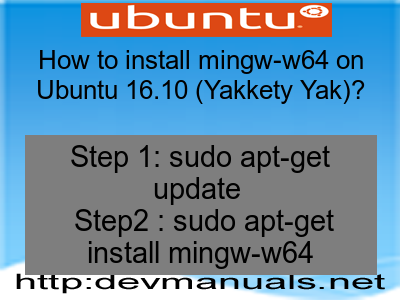

- #HOW TO INSTALL MINGW W64 ARCHIVE#
- #HOW TO INSTALL MINGW W64 64 BITS#
- #HOW TO INSTALL MINGW W64 SOFTWARE#
- #HOW TO INSTALL MINGW W64 LICENSE#

These include C, C++, Objective-C, Objective-C++, Fortran, and Ada. Most languages supported by GCC are supported on the MinGW port as well.
#HOW TO INSTALL MINGW W64 SOFTWARE#
MSYS2 ("minimal system 2") is a software distribution and a development platform for Microsoft Windows, based on Mingw-w64 and Cygwin, that helps to deploy code from the Unix world on Windows. It has since then gained widespread use and distribution.
#HOW TO INSTALL MINGW W64 64 BITS#
In 2007, a fork of the original MinGW called Mingw-w64 appeared in order to provide support for 64 bits and new APIs. In 2018, following a disagreement with SourceForge about the administration of its mailing lists, MinGW migrated to OSDN. MSYS (a contraction of "Minimal System") was introduced as a Bourne shell command line interpreter system with the aim of better interoperability with native Windows software. MinGW was selected as Project of the Month at SourceForge for September 2005. In 2000, the project was moved to SourceForge in order to solicit more assistance from the community and centralize its development. Mumit Khan later took over development, adding more Windows-specific features to the package, including the Windows system headers by Anders Norlander. Jan-Jaap van der Heijden created a Windows-native port of GCC and added binutils and make. Colin Peters authored the initial release in 1998, consisting only of a Cygwin port of GCC. The numbers were dropped in order to avoid the implication that it would be limited to producing 32-bit binaries. MinGW was originally called mingw32 ("Minimalist GNU for W32"), following the GNU convention whereby Windows is shortened as "W32". Although programs produced under MinGW are 32-bit executables, they can be used both in 32 and 64-bit versions of Windows. MinGW can be run either on the native Microsoft Windows platform, cross-hosted on Linux (or other Unix), or "cross-native" on Cygwin.
#HOW TO INSTALL MINGW W64 LICENSE#
MinGW does not rely on third-party C runtime dynamic-link library (DLL) files, and because the runtime libraries are not distributed using the GNU General Public License (GPL), it is not necessary to distribute the source code with the programs produced, unless a GPL library is used elsewhere in the program.
#HOW TO INSTALL MINGW W64 ARCHIVE#
MinGW includes a port of the GNU Compiler Collection (GCC), GNU Binutils for Windows ( assembler, linker, archive manager), a set of freely distributable Windows specific header files and static import libraries which enable the use of the Windows API, a Windows native build of the GNU Project's GNU Debugger, and miscellaneous utilities. The development of the MinGW project has been forked with the creation in 2005–2008 of an alternative project called Mingw-w64. MinGW ("Minimalist GNU for Windows"), formerly mingw32, is a free and open source software development environment to create Microsoft Windows applications. io (inactive and broken former domain of has expired) net /projects /mingw / (project page, still active) Public domain (headers), GNU General Public License (compiler and toolchain) Microsoft Windows, Unix-like (as a cross compiler)


 0 kommentar(er)
0 kommentar(er)
